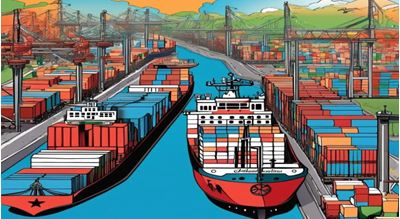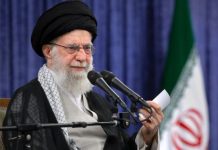Syed Laique Haider
Economic and political factors have had a profound influence on Pakistan’s foreign policy. On the international scene, Mercantilism has always been a decisive and major part of development and trade. According to this economic theory, Pakistan is able to leverage outer world markets through exporting surplus; it stores wealth; and, finally, it is always the protection of the domestic market. All these factors play a huge role in shaping the trade agreements, diplomatic relations, and international economic policies of Pakistan.From the beginning of its existence, Pakistan has always been a promoter of Mercantilism. In this way, the initial economic plans of the country drive to the fast growth of economy and expansion of the export sector, which are necessary to set this vision in or out of the country.
During the last seven decades, Pakistan’s foreign policy has attached the export-led growth path as its primary priority to increase output flow and promote trade diversification. The government has put in place protectionist measures including tariffs, quotas, and subsidies giving priority to domestic industries. Not only defensive, but these treaties also join hands with the countries from the Middle East like China, Turkey, and the Gulf states who come together in search of resources, markets, and investment. Regional economic cooperation has been realized via a number of trade and economic organizations like SAARC and ECO.
Mercantilism has been the engine of economic growth in Pakistan, materialising the goal of industrialization and job creation along with the exports. Trading has now been more diversified thereby, to a very big degree, decreasing the dependence in US and EU markets. Hence, Mercantilism has allowed Pakistan the space to engage in responsible, mutually beneficial military partnerships, as well as to pursue an independent foreign policy. However, difficulties like trade deficits,balance of payments issues and over-reliance on some few export commodities have crept in.
Pakistan’s strength lies in global trade, and it lies in regional economic cooperation and in supporting it also by competitive skills, regional value chains, and regional production networks. The country with the broadest network of good and service exports but not only(low-value products)is more likely to be successful. Moreover, productivity is a major driver of innovation and job creation. The sharing of good practices and experiences among them can accelerate the growth process in the different countries of the region. Along with India, Pakistan is on the same development path with more or less the same levels of development in various sectors. A great deal of infrastructure has been built in the last 70 years, but not much of it can be shared with other sectors rather than have a discussion on whether Mercantilism is responsible for Pakistan’s economic growth and its ability to possess strategic autonomy, it would be preferable to keep away from such traps.
For Pakistan to achieve its goals, it is very important to change its current policy and embrace an inclusive trading regime where the benefits cascading from the growth process are distributed pro-poor. Pakistan should diversify its goods and adhere to the Code of Conduct proposed by the United Nations Framework Agreement on the Regional Economic Cooperation in South Asia (India, 1990). Furthermore, multilateral trade pacts such as the South Asian Free Trade Area (SAFTA), the Central Asia Free Trade Area (CAFTA), the Gulf Cooperation Council (GCC), the Association of Southeast Asian Nations (ASEAN) or the Kellogg-Briand Pact will definitely be successful.
Rigorous policies are the hallmarks of Pakistan’s foreign policy which enables a sound economy and a strategic position. However, one can’t ignore the difficulties and drawbacks that are a result of these approaches. Through proper reformation in the world, the country could constantly achieve sustainable economic growth and strategic autonomy, as pledged. The main focus of the Mercantilist concept in foreign policy is the use of protectionism. The global economy is a kaleidoscope of both successful and broken countries. Prognosticating the winners from the losers of globalization depends on how the future dynamics of the market economy will evolve. The Joint Comprehensive Plan of Action (JCPOA) had even outlived the Biden administration and was still in force.
| “No politician ever gained power by not interfering in the market, and no special interest ever sponged off the rest of society by competing in the free market. That’s all the analysis you need to understand mercantilism.” Mark J. Perry |
The accomplishment of making Pakistan’s foreign policy sustainable through the promotion of mercantilist has been the main source of its economic dominance and strategic freedom. Moreover, in recent years, these problems have become even more important in evaluating whether this approach is really justified and whether it is even effective.The record-high trade deficits of Pakistan have prompted queries regarding the viability of its mercantilist policies. The country’s exports have lagged behind the imports, resulting in a trade deficit that has grown and put pressure on foreign exchange reserves. Along with that, Pakistan’s exports still rely on a few commodities, such as textiles and cotton, a situation that leaves the country in the hands of the ever-changing global demand and prices.

The entire protectionism outbreak and ensuing trade wars in the global sphere rearranged trade patterns, so Pakistan had to review and make amendments to its mercantilist strategy. The state has to handle the flow of global value chain and stay in cooperation with its partners and find access to new markets. Moreover, the political differences and lack of mutual economical features are still the reasons why Pakistan did not succeed when it comes to the regional economic organizations, such as SAARC and ECO.
The China-Pakistan Economic Corridor (CPEC) project has brought huge inputs and the infrastructure has benefited tremendously but there have also been worrying questions about the debt burden as well as the local industries’ condition. Pakistan has to make sure that CPEC enhances the whole economy and that it does not create an undesired level of reliance. Also, the claim that has been repeated is that usually, the pursuit of economic growth through mercantilism comes at the expense of environmental and social aspects.
Pakistan requires to incorporate environmental protection and social responsibility into its foreign policy so as to guarantee lasting prosperity. The assertion that educating, skill mastering, and research is the key to successful sustainable economic growth and comparative is irrefutable. These obstacles have to be addressed through a cleverly devised and flexible approach that includes the three crucial aspects of sustainable development, social responsibility, and human capital development.
Mercantilism is expected to take a leading position in the foreign policy of Pakistan as it sails through the whirlpools of the world economy. This economic course, which is mainly directed at exports, strategic trade agreements, and investments in local industries, is a definite mainstay of Pakistan’s foreign policy throughout its history. On the other hand, Mercantilism predicted to be the most influential factor for having Pakistan as a thriving economic hub, it may also opt for self-determined policies, and it may be instrumental in initiating eco-sustainability.The Mercantilist strategy of Pakistan will mainly consist of the expansion of their trade partnerships and development in the newer markets. Apart from looking for opportunities in Africa, Latin America, and Southeast Asia, Pakistan can utilize these avenues as its channels of trade with the rest of the globe. Besides rendering assistance to the US and the European Union as they cope with these crises, the country will likewise reinforce its connection with regional economic entities like SAARC, ECO, and SCO and pursuit of regional trade, investment, and economic growth.Investment ¾ hard infrastructure will be the driving force in Pakistan’s economy; that will also be accommodated by new factory startups and improved workforce skills.
The country will set up a high-quality infrastructure network that will be the backbone structure used for sustainable development. Pakistan by pursuing an export-led growth strategy can boost its international competitiveness, improve its production efficiency which can lead to the broadening in the range of goods they export.Strategic trade pacts with allies will ensure portal entrance, tariff reduction, and trade promotion. As a result, mutual economic cooperation will be the basic goal, followed by investment inflow, and market pull, all of which will ultimately improve Pakistan’s regional and global standing. The transition to a dynamic Pakistani digital economy and e-commerce industry would maximize trade, investment, and economic growth.
The important issues of sustainable development and environmental protection are being educated in Pakistan’s foreign policy to reach the point of balance between economic growth and environmental stability. It will also promote a positive global image, attract green finance, and support sustainable developments. A compelling factor of the Mercantilist approach in Pakistan is that the country will focus on its intellectual resources via education and innovation thus sustaining its economy environmentally, increasing efficiency and productivity.
All in all, Mercantilism will be the main propeller towards the foreign policy of Pakistan in the future, the engine which will drive the economic growth, the wheel which will ensure strategic autonomy, and the glue which will bind the sustainable development. While, the economy is walking through the storm, the Mercantilism will be the central steering wheel for the dynamic economic growth, the flourishing, and the protection of the national interests.












